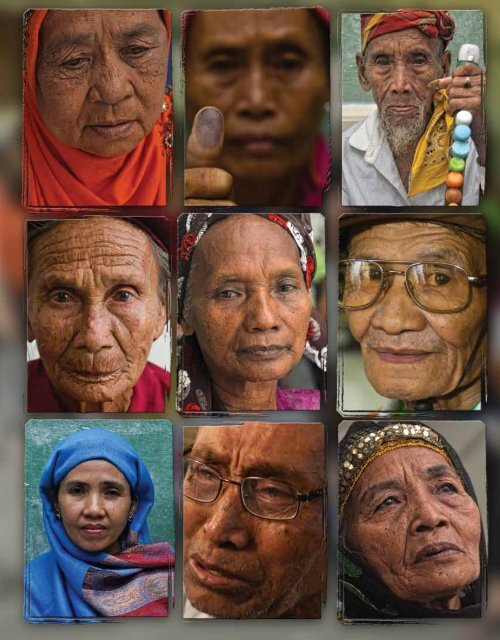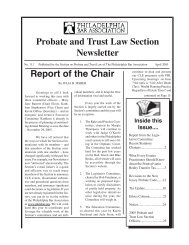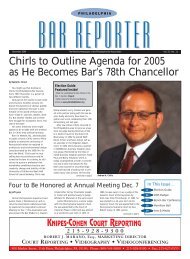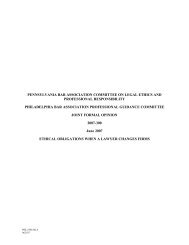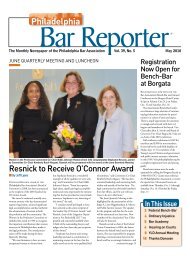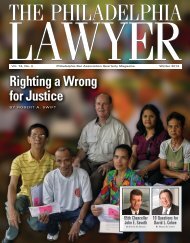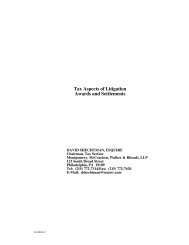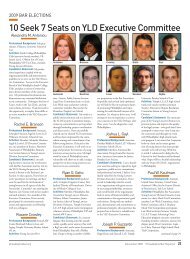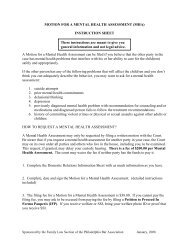A Human Rights Class Action Distribution in the Philippines
A Human Rights Class Action Distribution in the Philippines
A Human Rights Class Action Distribution in the Philippines
You also want an ePaper? Increase the reach of your titles
YUMPU automatically turns print PDFs into web optimized ePapers that Google loves.
Cover Story<br />
PHOTOGRAPHED BY Antonio Oquias
Filip<strong>in</strong>os wait <strong>the</strong>ir turn to receive <strong>the</strong>ir compensation for be<strong>in</strong>g victims of <strong>the</strong> regime of<br />
former Philipp<strong>in</strong>es President Ferd<strong>in</strong>and Marcos.<br />
Antonio Abiog approached me <strong>in</strong> a wheelchair, his emaciated body slumped to one side.<br />
Eighty-four years old with th<strong>in</strong>n<strong>in</strong>g gray hair and sunken cheeks, his eyes focused on me.<br />
After exam<strong>in</strong><strong>in</strong>g his paperwork, I located a check bear<strong>in</strong>g his name for 43,200 pesos (US<br />
$1,000). As I placed it <strong>in</strong> his hand and wrapped his f<strong>in</strong>gers around it, tears flowed down his cheeks.<br />
An earlier stroke made his words <strong>in</strong>decipherable. His son, stand<strong>in</strong>g beh<strong>in</strong>d him, expla<strong>in</strong>ed that his<br />
fa<strong>the</strong>r was cry<strong>in</strong>g tears of joy for he had never thought he would receive compensation for <strong>the</strong> torture<br />
he suffered <strong>in</strong> one of Ferd<strong>in</strong>and Marcos’ detention centers <strong>in</strong> <strong>the</strong> Philipp<strong>in</strong>es.<br />
Filip<strong>in</strong>o Victims Sue Marcos <strong>in</strong> <strong>the</strong> U.S.<br />
Abiog was one of over 7,500 Filip<strong>in</strong>os eligible to receive<br />
money <strong>in</strong> <strong>the</strong> Marcos <strong>Human</strong> <strong>Rights</strong> Litigation. Filed <strong>in</strong><br />
1986, <strong>the</strong> case consumed 25 years of arduous litigation to<br />
reach a po<strong>in</strong>t where <strong>the</strong> class members received <strong>the</strong>ir first<br />
compensation. It was <strong>the</strong> first class action human rights case<br />
<strong>in</strong> American and world jurisprudence. The class members<br />
were torture victims or <strong>the</strong> heirs of those summarily executed<br />
or disappeared. These jus cogens human rights violations<br />
occurred dur<strong>in</strong>g <strong>the</strong> martial law years 1972 through 1986<br />
when Marcos resorted to force to ma<strong>in</strong>ta<strong>in</strong> himself as a virtual<br />
dictator <strong>in</strong> <strong>the</strong> Philipp<strong>in</strong>es. Marcos’ modus operandi was to<br />
sign arrest orders of political deta<strong>in</strong>ees personally. Tens of<br />
thousands of Filip<strong>in</strong>os, mostly dissidents and opponents of<br />
<strong>the</strong> Marcos regime, were arrested and deta<strong>in</strong>ed for lengthy<br />
periods with no charges ever filed aga<strong>in</strong>st <strong>the</strong>m. A subset<br />
was tortured for <strong>in</strong>formation. Almost 5,000 were summarily<br />
executed, among whom 1,000 simply disappeared.<br />
Marcos died <strong>in</strong> 1989 <strong>in</strong> Hawaii three years after <strong>the</strong> People<br />
Power revolution toppled his regime. The litigation, filed <strong>in</strong><br />
Hawaii under <strong>the</strong> Alien Tort Statute, was vigorously defended<br />
by his widow, Imelda Marcos, and son, Ferd<strong>in</strong>and R. Marcos.<br />
The Judicial Panel on Multidistrict Litigation assigned <strong>the</strong> case<br />
to Judge Manuel L. Real, <strong>the</strong> <strong>the</strong>n chief judge of <strong>the</strong> Central<br />
District of California. He appo<strong>in</strong>ted me lead counsel. In 1991<br />
<strong>the</strong> case was certified as a class action. The liability phase<br />
of <strong>the</strong> jury trial began <strong>in</strong> 1992, followed by <strong>the</strong> exemplary<br />
damage and compensatory damage phases <strong>in</strong> 1994 and 1995.<br />
The same jury, after completion of all phases of trial, returned<br />
an overall verdict for 9,539 class members for nearly $2<br />
billion. The judgment was affirmed by <strong>the</strong> N<strong>in</strong>th Circuit <strong>in</strong><br />
1996 and is now a landmark <strong>in</strong> American and <strong>in</strong>ternational<br />
human rights jurisprudence.<br />
38 <strong>the</strong> philadelphia lawyer W<strong>in</strong>ter 2012
Robert A. Swift was lead counsel <strong>in</strong> <strong>the</strong> class action human rights damages<br />
distribution for victims of <strong>the</strong> Marcos regime. Each eligible class member<br />
received $1,000.
Collection Is Difficult<br />
Collection of <strong>the</strong> judgment proved exceed<strong>in</strong>gly difficult.<br />
Ferd<strong>in</strong>and and Imelda Marcos kept few assets <strong>in</strong> <strong>the</strong>ir own<br />
names, preferr<strong>in</strong>g alias names and shell corporations <strong>in</strong> tax<br />
havens such as Panama, Liechtenste<strong>in</strong> and Switzerland.<br />
Philipp<strong>in</strong>e courts have refused to this day to recognize <strong>the</strong> class<br />
action judgment even though Philipp<strong>in</strong>e<br />
procedure has a class action rule nearly<br />
identical to Federal Rule 23. The new<br />
Philipp<strong>in</strong>e government pursued Marcos<br />
assets worldwide and spent millions of<br />
dollars on legal counsel to oppose <strong>the</strong><br />
efforts of <strong>the</strong> human rights victims to<br />
recover <strong>the</strong> Marcos assets. Even a rul<strong>in</strong>g<br />
delivered by <strong>the</strong> United Nations <strong>Human</strong><br />
<strong>Rights</strong> Committee that <strong>the</strong> Philipp<strong>in</strong>e<br />
government had violated <strong>in</strong>ternational<br />
law by delay<strong>in</strong>g enforcement of <strong>the</strong><br />
class judgment did not provoke any<br />
change. Switzerland and <strong>the</strong> United<br />
States also opposed collection efforts by<br />
<strong>the</strong> victims.<br />
The recovery of $10 million of<br />
Marcos money <strong>in</strong> <strong>the</strong> United States –<br />
after six years of protracted litigation –<br />
was fortuitous and enabled <strong>the</strong> current<br />
distribution of $1,000 to all eligible<br />
class members. The amount was not<br />
adequate compensation for <strong>the</strong> abuses committed, but it was<br />
a mean<strong>in</strong>gful start. The amount represented roughly two<br />
years’ earn<strong>in</strong>gs for a farmer and four years’ earn<strong>in</strong>gs for a<br />
housekeeper. Many of <strong>the</strong> female claimants were housekeepers<br />
Despite <strong>the</strong>se<br />
demand<strong>in</strong>g<br />
conditions,<br />
distribution was<br />
highly effective.<br />
Almost 85 percent<br />
of <strong>the</strong> checks were<br />
distributed <strong>in</strong><br />
five weeks.<br />
s<strong>in</strong>ce that was <strong>the</strong> only work an under-educated mo<strong>the</strong>r with<br />
six children could perform after her husband was killed.<br />
<strong>Distribution</strong> to Victims<br />
The distribution marked <strong>the</strong> first time that human rights<br />
victims <strong>in</strong> Asia had ever been compensated for <strong>the</strong> abuses <strong>the</strong>y<br />
suffered. But distribution presented its<br />
own problems. The class had orig<strong>in</strong>ally<br />
been constituted <strong>in</strong> 1993, some 18<br />
years earlier. Addresses were old and<br />
most had not been updated. Worse,<br />
as I learned dur<strong>in</strong>g distribution, 15 to<br />
20 percent of <strong>the</strong> class members were<br />
deceased and necessitated replacement<br />
checks to <strong>the</strong> next of k<strong>in</strong>. Even use of <strong>the</strong><br />
mail had its limitations. The Philipp<strong>in</strong>e<br />
postal system was unreliable at best and<br />
corrupt <strong>in</strong> some regions. If checks were<br />
mailed, <strong>the</strong>y could be stolen and cashed<br />
by persons us<strong>in</strong>g false identification<br />
papers. So <strong>the</strong>re was no effective<br />
alternative to distribut<strong>in</strong>g checks to each<br />
eligible claimant <strong>in</strong> person.<br />
In February 2011 letters were mailed<br />
to eligible claimants <strong>in</strong>form<strong>in</strong>g <strong>the</strong>m<br />
of <strong>the</strong>ir eligibility and <strong>the</strong> date and<br />
place where <strong>the</strong>y could go to receive<br />
<strong>the</strong>ir checks. As evidence of <strong>the</strong>ir<br />
eligibility, <strong>the</strong>y were asked to br<strong>in</strong>g with <strong>the</strong>m my letter and<br />
two forms of photo identification. I selected 16 distribution<br />
po<strong>in</strong>ts throughout <strong>the</strong> Philipp<strong>in</strong>es where <strong>the</strong> largest numbers<br />
of claimants resided. <strong>Human</strong> rights groups, <strong>the</strong> Philipp<strong>in</strong>e
Commission on <strong>Human</strong> <strong>Rights</strong> (CHR)<br />
and <strong>the</strong> media all publicized <strong>the</strong><br />
locations and dates.<br />
A press conference on Feb. 28<br />
launched <strong>the</strong> distribution. It was held<br />
at Club Filip<strong>in</strong>o <strong>in</strong> Metro Manila<br />
where Cory Aqu<strong>in</strong>o was <strong>in</strong>augurated<br />
as president 25 years earlier. Philipp<strong>in</strong>e<br />
and <strong>in</strong>ternational media attended <strong>the</strong><br />
press conference and spread <strong>the</strong> news<br />
across Asia, <strong>the</strong> Middle East and <strong>the</strong><br />
United States.<br />
Security Issues<br />
<strong>Distribution</strong> posed security issues.<br />
Crim<strong>in</strong>al groups might try to steal<br />
<strong>the</strong> checks and negotiate <strong>the</strong>m before<br />
stop payments could be issued. Six<br />
of <strong>the</strong> distribution locations were<br />
<strong>in</strong> M<strong>in</strong>danao where 30 percent of<br />
<strong>the</strong> claimants resided. A sporadic<br />
armed <strong>in</strong>surgency was alive and<br />
well <strong>in</strong> Muslim prov<strong>in</strong>ces <strong>the</strong>re, and<br />
kidnapp<strong>in</strong>gs were commonplace. At<br />
<strong>the</strong> urg<strong>in</strong>g of <strong>the</strong> CHR, <strong>the</strong> Philipp<strong>in</strong>e<br />
National Police and <strong>the</strong> armed forces<br />
of <strong>the</strong> Philipp<strong>in</strong>es provided security<br />
<strong>in</strong> <strong>the</strong> form of pla<strong>in</strong>clo<strong>the</strong>smen and<br />
armed soldiers. They accompanied my<br />
colleagues and me from airport to hotel<br />
to distribution center. Fortunately, <strong>the</strong>re<br />
was no violence.<br />
The claimants had a different<br />
security issue. Once <strong>the</strong>y received<br />
a check <strong>the</strong>y needed to convert it to<br />
currency and f<strong>in</strong>d <strong>the</strong>ir way home.<br />
Few had bank accounts. The bank <strong>the</strong><br />
checks were drawn on had 500 branch<br />
offices throughout <strong>the</strong> country and at<br />
least one branch <strong>in</strong> each distribution<br />
city. Claimants usually arrived with<br />
one or two family members and went<br />
to <strong>the</strong> bank immediately after receiv<strong>in</strong>g<br />
a check. There was but one reported<br />
robbery of a claimant.<br />
<strong>Distribution</strong> at each location was<br />
designed to be as quick and efficient<br />
as possible. A triage system was<br />
employed to speedily process those<br />
claimants whose names were on a<br />
list and who brought my letter and<br />
photo identification. Those on <strong>the</strong> list<br />
but lack<strong>in</strong>g my letter were processed<br />
separately and asked questions about<br />
<strong>the</strong>ir claims to verify that <strong>the</strong>y were<br />
<strong>the</strong> correct claimant. Family members<br />
of deceased claimants were asked<br />
to produce death certificates and<br />
questioned as to whe<strong>the</strong>r <strong>the</strong>y were <strong>in</strong><br />
fact <strong>the</strong> next of k<strong>in</strong>. Those not on <strong>the</strong><br />
list went to a third table where <strong>the</strong>y<br />
completed forms expla<strong>in</strong><strong>in</strong>g why <strong>the</strong>y<br />
believed <strong>the</strong>y had an eligible claim.<br />
Local members of human rights<br />
groups were employed to assist with<br />
<strong>the</strong> process<strong>in</strong>g. A colleague or I aga<strong>in</strong><br />
scrut<strong>in</strong>ized <strong>the</strong> list for <strong>the</strong> claimant’s<br />
name and reviewed identification<br />
papers before hand<strong>in</strong>g out a check.<br />
For those who had to wait, <strong>the</strong>re were<br />
chairs and water s<strong>in</strong>ce <strong>the</strong> wea<strong>the</strong>r <strong>in</strong><br />
this pre-summer period was predictably<br />
hot and humid.<br />
The Poorest of <strong>the</strong> Poor<br />
The claimants were truly <strong>the</strong> poorest<br />
of <strong>the</strong> poor. The death of a loved one<br />
had taken an emotional and f<strong>in</strong>ancial<br />
toll on <strong>the</strong>ir lives. Many were older and<br />
hardship was evident on <strong>the</strong>ir wr<strong>in</strong>kled,<br />
wizened faces. The oldest to appear<br />
was 89 years old though quite a few<br />
were <strong>in</strong> <strong>the</strong>ir 70s and early 80s. Most<br />
traveled by bus, sometimes with money<br />
loaned from relatives. Depend<strong>in</strong>g on<br />
where <strong>the</strong>y lived, some traveled for as<br />
much as 10 hours, often at night. I was<br />
surprised to see as many as 100 people<br />
wait<strong>in</strong>g for me when a distribution<br />
center opened at 8 a.m.<br />
Most smiled at meet<strong>in</strong>g me and<br />
expressed <strong>the</strong>ir gratitude. A few told<br />
me <strong>the</strong>y believed justice had been<br />
done. Some showed me <strong>the</strong>ir gunshot<br />
wounds, amputation or photos of <strong>the</strong>ir<br />
deceased loved ones. O<strong>the</strong>rs embraced<br />
me; several cried <strong>in</strong> my arms. A firm<br />
handshake needed no translation.<br />
Curiosity compelled me to <strong>in</strong>quire<br />
how <strong>in</strong>dividual claimants planned to<br />
spend <strong>the</strong> money. Many farmers said<br />
<strong>the</strong>y would buy a carabao (water ox)<br />
or acquire more land. O<strong>the</strong>rs planned<br />
to place an engraved stone at <strong>the</strong> site<br />
of <strong>the</strong>ir loved one’s grave or repair<br />
<strong>the</strong>ir house. Some wanted to educate<br />
<strong>the</strong>ir children or grandchildren or buy<br />
medic<strong>in</strong>e. In M<strong>in</strong>danao, where men<br />
often have more than one wife, one<br />
man told me that now he could afford<br />
a third wife.<br />
Despite <strong>the</strong>se demand<strong>in</strong>g conditions,<br />
distribution was highly effective.<br />
Almost 85 percent of <strong>the</strong> checks were<br />
distributed <strong>in</strong> five weeks. Consider<strong>in</strong>g<br />
that eligible claimants had to appear<br />
with <strong>the</strong>ir papers at a place and on a date<br />
with <strong>the</strong>ir papers <strong>in</strong> hand, <strong>the</strong> turnout<br />
was remarkable. A second phase of<br />
distribution improved distribution to 97<br />
percent.<br />
Instill<strong>in</strong>g Fear and<br />
Discontent<br />
In a letter handed to me while I was<br />
<strong>in</strong> M<strong>in</strong>danao, a cloistered nun described<br />
<strong>the</strong> torture and murder of her bro<strong>the</strong>r,<br />
Emmanuel. The story rem<strong>in</strong>ded me<br />
of many o<strong>the</strong>r accounts presented <strong>in</strong><br />
court dur<strong>in</strong>g <strong>the</strong> trial. Sister Scholastica<br />
Rosales expla<strong>in</strong>ed how Emmanuel,<br />
a teenage leftist, was seized by <strong>the</strong><br />
military, tortured over several days,<br />
<strong>the</strong>n shot and thrown <strong>in</strong>to a remote<br />
mass grave while still breath<strong>in</strong>g. To <strong>the</strong><br />
anger of <strong>the</strong> local military commander,<br />
her family later found <strong>the</strong> grave with<br />
<strong>the</strong> help of a witness to <strong>the</strong> kill<strong>in</strong>g and<br />
reburied her bro<strong>the</strong>r’s decomposed<br />
rema<strong>in</strong>s. She wrote, “it is ironic that<br />
people who are supposed to protect<br />
and secure peace and order are <strong>the</strong> ones<br />
who cause and <strong>in</strong>stilled fear, discontent,<br />
<strong>in</strong>justice and death.” She stated she<br />
cried four times while writ<strong>in</strong>g <strong>the</strong> letter<br />
and blessed those attorneys who had<br />
persevered to obta<strong>in</strong> justice for <strong>the</strong><br />
victims. In a refra<strong>in</strong> born of her faith,<br />
she added, “I forgive those who caused<br />
so much pa<strong>in</strong> and suffer<strong>in</strong>g to us.”<br />
• • •<br />
Too often victims of human rights<br />
abuses are forgotten. Governments,<br />
especially our own, treat victims like<br />
pawns while <strong>the</strong>y castigate o<strong>the</strong>r<br />
governments for committ<strong>in</strong>g human<br />
rights abuses. When repressive dictators<br />
are overthrown, new governments<br />
ignore <strong>the</strong> victims. <strong>Human</strong> rights<br />
groups sh<strong>in</strong>e a spotlight on abuses<br />
and abusive regimes but have more<br />
important priorities than <strong>the</strong> welfare of<br />
victims. It is ironic that it is far easier<br />
to recover for property damage from<br />
a right-angle auto collision than for<br />
torture <strong>in</strong> a third-world country. The<br />
Marcos case did not change this but<br />
did show an enlightened approach <strong>the</strong><br />
judiciary can take to achieve justice<br />
and compensate victims of he<strong>in</strong>ous<br />
abuses.<br />
Robert A. Swift<br />
(rswift@kohnswift.com) is a partner<br />
with Kohn, Swift & Graf, P.C.<br />
<strong>the</strong> philadelphia lawyer W<strong>in</strong>ter 2012 41


